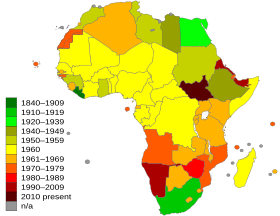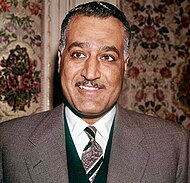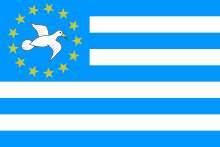
The Africa Cup of Nations commonly referred to as the TotalEnergies Africa Cup of Nations for sponsorship reasons, or simply AFCON or CAN, is the main international men's association football competition in Africa. It is sanctioned by the Confederation of African Football (CAF) and was first held in 1957. Since 1968, it has been held every two years, switching to odd-numbered years in 2013.

The United Nations Economic Commission for Africa was established in 1958 by the United Nations Economic and Social Council to encourage economic cooperation among its member states following a recommendation of the United Nations General Assembly. It is one of five regional commissions.

Maghrebi Jews or North African Jews are ethnic Jews who had traditionally lived in the Maghreb region of North Africa under Arab rule during the Middle Ages. Established Jewish communities had existed in North Africa long before the arrival of Sephardi Jews, expelled from Portugal and Spain. The term Musta'arabi was also used by medieval Jewish authors to refer to Jews who had traditionally lived in the Maghreb. Due to proximity, the term 'Maghrebi Jews' sometimes refers to Egyptian Jews as well, even though there are important cultural differences between the history of Egyptian and Maghrebi Jews. These Jews originating from North Africa constitute the second largest Jewish diaspora group.

The Libya national football team represents Libya in men's international association football and it is controlled by the Libyan Football Federation. The team has never qualified for FIFA World Cup but has qualified for editions of Africa Cup of Nation in 1982, 2006, and 2012. In 1982, the team was both the host and runner-up. In the Arab Cup, Libya finished second in 1964 and 2012, and third in 1966. The team is affiliated with both FIFA and Confederation of African Football (CAF).
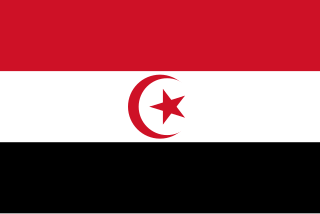
The Arab Islamic Republic was a proposed unification of Tunisia and Libya in 1974, agreed upon by Libyan head of state Muammar Gaddafi and Tunisian President Habib Bourguiba. Additional countries—Morocco and Algeria—were later included in the proposal, which was never implemented.

The decolonisation of Africa was a series of political developments in Africa that spanned from the mid-1950s to 1975, during the Cold War. Colonial governments gave way to sovereign states in a process often marred by violence, political turmoil, widespread unrest, and organised revolts. Major events of decolonisation of Africa include the Mau Mau rebellion, the Algerian War, the Congo Crisis, the Angolan War of Independence, the Zanzibar Revolution, and the events leading to the Nigerian Civil War.[1][2][3][4][5]

The individual member states of the African Union (AU) coordinate foreign policy through this agency, in addition to conducting their own international relations on a state-by-state basis. The AU represents the interests of African peoples at large in intergovernmental organizations (IGO's); for instance, it is a permanent observer at the United Nations' General Assembly.
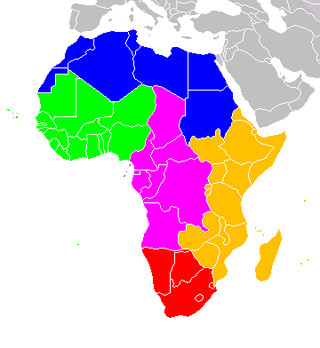
The following is an alphabetical list of subregions in the United Nations geoscheme for Africa, used by the United Nations and maintained by the UNSD department for statistical purposes.
The New Constitutional Liberal Party, most commonly known as Neo Destour, was a Tunisian political party founded in 1934 in Dar Ayed, the house of independence activist Ahmed Ayed, by a group of Tunisian nationalist politicians during the French protectorate. It originated from a split with the Destour party.

In its modern history, Tunisia is a sovereign republic, officially called the Republic of Tunisia. Tunisia has over ten million citizens, almost all of Arab-Berber descent. The Mediterranean Sea is to the north and east, Libya to the southeast, and Algeria to the west. Tunis is the capital and the largest city ; it is located near the ancient site of the city of Carthage.
Association football is the most popular sport in nearly every African country, and thirteen members of the Confederation of African Football (CAF) have competed at the sport's biggest event – the FIFA World Cup.

The African Nations Championship, known for sponsorship purposes as the TotalEnergies African Nations Championship and commonly abbreviated as CHAN, is a biennial African association football tournament organized by the Confederation of African Football (CAF) since 2009 and first announced on 11 September 2007. The participating nations must consist of players playing in their national league competitions.

Tourism is an important economic sector for many countries in Africa. There are many countries that benefit heavily from tourism like Uganda, Algeria, Egypt, South Africa, Kenya, Morocco, Tunisia, Ghana and Tanzania. The touristic particularity of Africa lies in the wide variety of points of interest, diversity and multitudes of landscapes as well as the rich cultural heritage. Also, an ecotourist industry is present in some African countries.

This is a list of the Egypt national football team results from 2000 to 2019.

This is a list of the Libya national football team results from 2000 until 2019.

From 2018, the Anglophone Crisis drew increasing international attention, and became a challenge to Cameroon's foreign relations. Triggered by a violent crackdown on the 2016–2017 Cameroonian protests, the conflict escalated from a low-scale insurgency to a civil war-like situation. While Cameroon enjoys support from African countries, no country has openly supported the Ambazonian independence movements. However, many countries have put pressure on Cameroon to talk to the separatists. In addition, the separatists enjoy support from officers in the Nigerian Army, who have helped arrange arms deals for them.

This is a list of the Tunisia national football team results from 2000 to 2019.

Third Conference of the Non-Aligned Movement on 8–10 September 1970 in Lusaka, Zambia was the third conference of the Non-Aligned Movement. A preparatory meeting of Foreign Ministers drafted a number of resolutions which were considered by the Summit Conference. President of Zambia Kenneth Kaunda opened the conference by underlining non-alignment as "the natural choice at the time of increased hostility created by ideological conflicts in the bipolar world"
This article lists the results of the Morocco national football team from 1990 to 2019.
1982 Extraordinary Ministerial Meeting of the Non-Aligned Movement on the topic of Palestine took place in Kuwait City, capital of Kuwait from 5 to 8 April. It was the first of the three meetings on Palestine that the Non-Aligned Movement organized in that year. The meeting in Kuwait was called by the Coordinating Bureau of the Movement during the NAM United Nations Headquarters meeting in New York which took place between 25 and 28 September 1981. The meeting provided the first opportunity for Egypt, one of the founding members of the Movement, to attends a conference in an Arab country that severed diplomatic relations with Cairo after the 1978 Camp David Accord.
